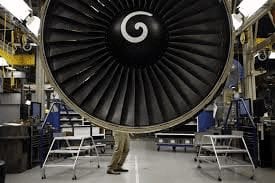U.S. charges Chinese intelligence officers for jet engine data hack – By Sarah N. Lynch, David Shepardson (reuters.com) / Oct 31 2018
WASHINGTON (Reuters) – Chinese intelligence officers conspired with hackers and company insiders to break into private companies’ computer systems and steal information on a turbo fan engine used in commercial jetliners, according to a U.S. indictment unsealed on Tuesday.
The indictment said that at the time of the hacks, a Chinese-state owned aerospace company was working to develop a comparable engine for use in aircraft manufactured in China and in other countries.
Chinese-made jets, including the C919 and ARJ21, currently use foreign engines but the country has been trying to develop a competitive homegrown alternative.
The 10 people charged conspired to steal sensitive data “that could be used by Chinese entities to build the same or similar engine without incurring substantial research and development expenses,” the indictment released by the U.S. Department of Justice said.
It said more than a dozen companies were targeted, but only Capstone Turbine Corp (CPST.O) was identified by name.
The Justice Department said those hacked included a French firm co-developing a turbofan jet engine with a U.S. company.
France’s only civil turbofan engine maker, Safran SA (SAF.PA), co-develops engines with U.S.-based General Electric Co (GE) (GE.N) through their longstanding CFM International partnership, the world’s biggest jet engine manufacturer by number of units sold.
The venture’s latest engine, known as LEAP, powers the largest category of Airbus SE (AIR.PA) and Boeing Co (BA.N) jets and includes a version for China’s new passenger plane, the Commercial Aircraft Corporation of China (COMAC) C919.
A Safran spokesman in China declined to comment and the company’s French head office could not be contacted outside normal business hours.
GE declined to comment.
The indictment charges Zha Rong and Chai Meng along with other co-conspirators who worked for the Jiangsu province Ministry of State Security, a unit of the foreign intelligence arm of the Ministry of State Security.
It says their efforts to steal sensitive commercial aviation and other data took place from January 2010 through May 2015.
Chinese Foreign Ministry spokesman Lu Kang said the charges were groundless.
“The relevant accusations are pure fiction and totally fabricated,” he told reporters in Beijing, without elaborating.
This is the third major corporate espionage-related case involving Chinese intelligence officers brought by the Justice Department since last month.
In late September, a Chinese national who had also enlisted in the U.S. Army Reserve was arrested in Chicago for working for Chinese intelligence to recruit engineers and scientists, including some who worked for U.S. defense contractors.
In October, the Justice Department also announced it had arrested a spy for China’s Ministry of State Security on charges of economic espionage and attempting to steal trade secrets from several U.S. aviation and aerospace companies.
In that matter, the FBI said the extradition of Chinese operative Xu Yanjun from Belgium was unprecedented, and the case highlighted the Chinese government’s direct control over economic espionage in the United States.
John Demers, the head of the Justice Department’s National Security Division, highlighted the pattern of the three cases in a public statement.
“This is just the beginning,” he said. “Together with our federal partners, we will redouble our efforts to safeguard America’s ingenuity and investment.”



















